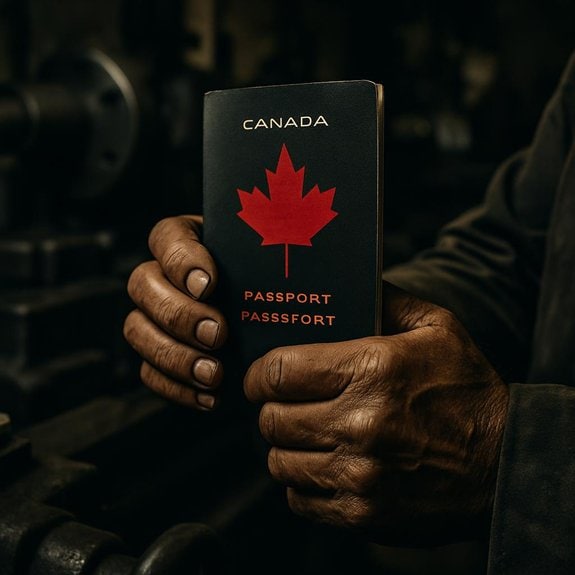
Yes, you can legally leave an abusive employer and remain in Canada through specific immigration protections. The Open Work Permit for Vulnerable Workers allows you to switch employers without losing your immigration status, processing within five business days at no cost. You’ll need supporting evidence like emails, photos, or official reports documenting the abuse. Additional options include Temporary Resident Permits and status restoration if your permit expires during abuse situations. Understanding these protections and application requirements will help you navigate your path to safety and legal security.
Understanding Workplace Abuse and Its Impact on Immigrant Workers
When immigrants enter Canada’s workforce, they face a significantly higher risk of experiencing workplace abuse compared to their Canadian-born counterparts. Statistics Canada reveals that 35% of immigrant women and 20% of immigrant men report workplace abuse, yet they’re less likely to report incidents than Canadian-born workers.
Immigrant workers face 35% higher abuse rates yet report incidents less frequently than Canadian-born employees due to systemic vulnerabilities.
You’ll find that workplace abuse encompasses physical assault, sexual harassment, psychological intimidation, and financial exploitation.
As a newcomer, you’re particularly vulnerable due to language barriers, unfamiliarity with employment rights, and fear of deportation. These challenges create significant power imbalances between you and employers.
Cultural differences and limited social connections further isolate you from potential support systems.
Unfortunately, temporary foreign workers often avoid reporting abuse, fearing job loss could jeopardize their immigration status and ability to remain in Canada.
Legal Protections Available for Abused Immigrant Employees
If you’re experiencing workplace abuse as an immigrant in Canada, several legal protections can help you maintain your status while escaping dangerous employment situations.
The Open Work Permit for Vulnerable Workers represents your primary protection, allowing you to leave abusive employers without losing immigration status. This permit covers physical, sexual, psychological, and financial abuse, processing applications within five business days at no cost.
If you’re experiencing family violence, you can apply for a fee-exempt Temporary Resident Permit, providing at least 12 months of legal status with work authorization.
Additional options include status restoration within 90 days of permit expiry, humanitarian and compassionate applications for permanent residence, and sponsorship opportunities.
You’re also protected under employment standards legislation and can report violations to enforcement agencies.
Open Work Permit for Vulnerable Workers: Your Path to Freedom
The Open Work Permit for Vulnerable Workers stands as Canada’s most direct solution for immigrants trapped in abusive employment situations. This permit allows you to leave your abusive employer while maintaining your legal immigration status in Canada.
You’re eligible if you hold a valid LMIA-required work permit or LMIA-exempt employer-specific work permit while currently in Canada.
The application process is streamlined and urgent, typically processed within five business days. You’ll need to submit a detailed letter explaining your situation along with supporting evidence like reports from support organizations, sworn affidavits, or official complaints filed with enforcement agencies.
The permit exempts you from standard processing fees and grants freedom to work for any Canadian employer, effectively breaking the chains that bind you to your abuser.
Temporary Resident Permit for Victims of Family Violence
Family violence victims who’ve lost their immigration status or face imminent deportation can find sanctuary through Canada’s Temporary Resident Permit (TRP) program. This permit provides temporary legal status for at least 12 months, with renewal options based on your circumstances.
You don’t need to testify against your abuser to qualify for this protection. The TRP allows you to work, access healthcare, and explore permanent residency options while maintaining legal status in Canada.
Both initial applications and renewals are fee-exempt, removing financial barriers during vulnerable periods.
To apply, you’ll need to demonstrate you’re experiencing family violence through documentation and evidence. Connect with victim services and legal professionals who can guide you through the application process and help you access additional support resources.
Eligibility Requirements and Application Process
Understanding which immigration scenarios qualify for protection requires examining specific permit categories and their distinct requirements.
You must meet specific criteria to access protective immigration measures when facing workplace or domestic abuse.
For open work permits targeting vulnerable workers, you need:
- Valid LMIA-required work permit or LMIA-exempt employer-specific permit
- Current authorization to work in Canada or pending renewal application
- Documentation proving abuse or risk of abuse from your employer
- Physical presence in Canada during application submission
- Evidence supporting your abuse claims through official reports or witness statements
For temporary resident permits addressing family violence, you’ll qualify if you’re experiencing domestic abuse regardless of current immigration status.
Both applications require thorough documentation, including incident reports, medical records, and statements from support organizations to strengthen your case.
Types of Evidence Needed to Support Your Case
Documentation serves as the foundation of any successful application for protective immigration measures, requiring you to systematically gather concrete proof that validates your abuse claims.
You’ll need written evidence like threatening emails, text messages, or discriminatory communications from your employer. Photographic documentation of unsafe working conditions, injuries, or workplace violations strengthens your case considerably.
Official reports carry substantial weight, including complaints filed with police, labour ministries, or the Canada Border Services Agency. Medical records documenting physical or psychological harm provide essential professional validation.
Official documentation from authorities and medical professionals provides the strongest evidence to substantiate claims of workplace abuse or exploitation.
Witness statements from coworkers who’ve observed abusive behaviour offer additional credibility.
You should also collect employment documents showing contract violations, unpaid wages, or unreasonable working conditions. Support letters from healthcare professionals, social workers, or victim services organizations demonstrate the abuse’s impact and establish your credibility with immigration authorities.
Overcoming Barriers That Prevent Reporting Workplace Abuse
Although systemic barriers often discourage immigrants from reporting workplace abuse, you can take concrete steps to overcome these obstacles and protect your rights. Understanding your options and accessing proper support greatly increases your chances of escaping abusive situations while maintaining your immigration status.
- Seek legal guidance from immigration lawyers or consultants who understand both employment law and immigration regulations specific to your situation.
- Connect with immigrant support organizations that provide language assistance, cultural understanding, and advocacy services tailored to newcomers.
- Document everything thoroughly by keeping records of incidents, communications, and evidence that support your abuse claims.
- Learn your employment rights through government resources and workshops that explain Canadian labour standards and protections.
- Build support networks with trusted colleagues, community members, or counsellors who can provide emotional support and witness testimony.
Additional Immigration Options for Abuse Victims
Beyond the open work permit for vulnerable workers, several specialized immigration pathways exist for abuse victims who need more thorough protection or permanent solutions.
You can apply for a Temporary Resident Permit if you’re experiencing family violence, which provides at least 12 months of legal status without fees. This permit doesn’t require you to testify against your abuser and can be renewed based on your circumstances.
If your work permit expires during the abuse situation, you’ve got 90 days to restore your status. You can also pursue permanent residence through Humanitarian and Compassionate grounds, especially when facing violence.
Additionally, if your abuser is a Canadian citizen or permanent resident, sponsorship options may be available. These pathways offer extensive protection beyond temporary work authorization.
How Canadian Currents Immigration Services Can Help
When you’re facing workplace or family abuse in Canada, having the right legal support can make the difference between successfully securing protection and struggling through complex immigration processes alone.
Canadian Currents Immigration Services (part of TJ Law Group with Taylor Janis Workplace Law) provides specialized assistance for immigrants managing abuse-related immigration matters. Our team combines decades of experience to deliver tailored solutions for your unique situation.
Decades of specialized experience helping immigrants navigate complex abuse-related immigration matters with personalized, expert legal solutions.
- Expert legal guidance from immigration lawyers, consultants, and paralegals with extensive abuse case experience
- Personalized application support for open work permits, temporary resident permits, and status restoration
- Evidence preparation assistance to strengthen your abuse documentation and supporting materials
- Cost-effective representation that makes professional legal services accessible during difficult times
- Comprehensive case management ensuring all immigration options are explored and deadlines met
We’ll work with you to achieve the best possible outcome for your specific circumstances.

We currently have three offices across Alberta — Edmonton, Calgary, and Red Deer. We serve the entire province of Alberta (and BC). We also have the infrastructure to work with any of our clients virtually — even the furthest regions of Alberta.
Call 1 (844) 224-0222 (toll free) to get routed to the best office for you or contact us online for general inquiries.
We also have a dedicated intake form to help you get the ball rolling. Our intake team will review your specific case and advise you on the next steps to take as well as what to expect moving forward.
Our offices are generally open 8:30 a.m.—5:00 p.m., Mon—Fri.

Our main hub for British Columbia is located in the heart of Vancouver. We also have a Kamloops Office for interior residents. That said, we serve the entire province of BC. We have the infrastructure to work with any of our clients virtually — even the furthest regions of British Columbia.
Call (604) 423-2646 [toll free 1-877-402-1002] to get routed to the best representative to serve you or contact us online for general inquiries.
We also have a dedicated intake form to help you get the ball rolling. Our intake team will review your specific case and advise you on the next steps to take as well as what to expect moving forward.
Our offices are generally open 8:30 a.m.—5:00 p.m., Mon—Fri.


Alfonso Chen
WORKPLACE LAWYER
Alfonso Chen is a civil litigator in our Vancouver office who can provide services in both Mandarin and English. He has appeared before and won cases in the Supreme Court of British Columbia, the Provincial Court of British Columbia, and numerous tribunals.
PRIVACY NOTICE: Any information you provide to our office — whether your personal information or employment/employer details — will be treated as strictly confidential and will not be disclosed to your employer or to any other third party. So, please be reassured that you can talk openly to our capable Intake Paralegals worry free. Fill out an Online Inquiry or call us now, your information will be in safe and helping hands.
The Legal Review Process by Taylor Janis Workplace Law
- Taylor Janis strives for high-quality, legally verified content.
- Content is meticulously researched and reviewed by our legal writers/proofers.
- Details are sourced from trusted legal sources like the Employment Standards Code.
- Each article is edited for accuracy, clarity, and relevance.
- If you find any incorrect information or discrepancies in legal facts, we kindly ask that you contact us with a correction to ensure accuracy.


